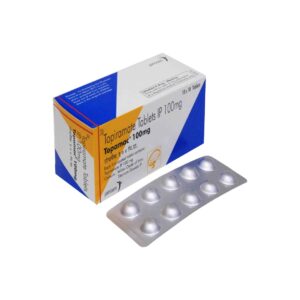Topper 50 mg
Topper 50mg is an antiepileptic (AED)/anticonvulsant medication that is used to treat epilepsy (monotherapy and adjunctive therapy) and can also be used to prevent migraines. Epilepsy is a chronic condition in which the body has unprovoked, repeated seizures. A seizure occurs when the brain experiences a sudden attack and the person loses control of their actions. Migraine is a mental disorder that produces severe or painful headaches, as well as difficulties speaking, nausea, vomiting, and light or sound sensitivity.
Topper 50mg is in charge of restoring neural activity equilibrium by reducing the spread of seizure movement in the brain. Controlling the electrical activity of the brain prevents seizures and alleviates migraine symptoms. Topper 50mg should be taken on an empty stomach with one glass of water. Only with prescription is Topper 50mg available. It comes in the form of pills or capsules that are only to be taken by mouth. Without crushing or fracturing the drug, swallow it whole. Topper 50mg dosages are occasionally recommended based on a kid’s weight, and the doctor will adjust the dose if the child gains or loses weight.
Topiramate’s potential side effects include sleepiness, dizziness, diarrhea, and nausea. Some of the adverse effects are modest and fade away on their own, so they don’t require medical treatment. If any of these adverse effects persist or worsen over time, speak with your doctor.
Topper 50 mg should not be used by those who are hypersensitive to it, therefore tell your doctor if you are allergic to any of the chemical elements in this medicine. If you’ve ever experienced diarrhea, glaucoma, metabolic acidosis, lung disease, breathing issues, liver disease, or a blood disorder called acute porphyria, tell your doctor. If a woman is pregnant or expecting to become pregnant, she should tell her doctor since taking this prescription during pregnancy increases the chance of cleft lip and/or cleft palate, which are birth defects that can occur during early pregnancy.
Topper 50mg is used to treat epilepsy and migraines.
Medicinal Advantages
Topper 50mg is an antiepileptic (AED) medication used to treat migraines and epilepsy in mono or adjunctive therapy. Topper 50mg is recommended for patients over the age of 2 who have partial-onset or primary generalized tonic-clonic seizures. Topper 50mg is recommended for patients aged 2 to 16 years old who have partial-onset seizures or primary generalized tonic-clonic seizures, and for patients older than 2 years old who have seizures linked with Lennox-Gastaut syndrome (LGS). Topper 50mg has been recommended for migraine prevention. Topper 50mg works by enhancing the inhibitory effects of GABA and inhibiting voltage-dependent sodium and calcium channels. Topper 50mg stops or regulates seizures in epilepsy by controlling the unregulated activity of nerves in the brain. Topper 50mg calms down the hyperactive nerve cells in the brain that cause migraine headaches.
Use Instructions
In general, Topper 50mg should be begun at a low dose and then gradually increased over 1 or 2 weeks, depending on the patient’s needs. To optimize Topper 50mg in epilepsy, plasma concentrations must be monitored. This medication should not be taken with food. Sprinkle Capsules of Topper 50mg can be eaten whole without chewing if a person is taking them. However, the entire contents can be sprinkled on the teaspoon of food. This drug must be consumed right once and cannot be saved for later use. Topper 50mg should be used for the entire time period recommended by the doctor; discontinuing it suddenly may result in seizures. Try to take Topper 50mg at the same time every day; however, if a person forgets to take their medication, they should miss that dose if the following dose is less than 6 hours away.
Store in a cool, dry location away from direct sunlight.
Topper 50mg Side Effects
Topper 50mg may have some negative side effects in addition to the positive ones. However, these side effects do not affect everyone, and in certain cases, they do not necessitate medical treatment. Tingling in the arms and legs, nausea, taste changes, diarrhea, weight loss, agitation, upper respiratory tract infection, and other side effects of Topper 50mg are possible. If a person experiences severe negative effects or side effects that last a long time after taking Topper 50mg, they should seek medical advice.
Drug Recommendations
Topiramate can induce a congenital defect called cleft lip in an unborn baby, hence it is not recommended for pregnant women to take it. Topiramate can raise the body temperature and decrease sweating, so if you’re sweating less and have hot, dry skin, you should see a doctor. Topiramate may increase the amount of acid in the blood, so if you have irregular heartbeats or lose appetite, tell your doctor. If you have diarrhea, metabolic acidosis, eye difficulties, or liver illness, tell your doctor before using Topiramate. Contraceptives such as the combination pill, vaginal ring, patches, progestogen-only contraceptive pill, and emergency contraception may be affected by topiramate. If you are using contraceptives to avoid pregnancy, you should tell your doctor.
Interactions Between Drugs
Drug-Drug Interactions: Tell your doctor about all of your medications, including diabetes medications (metformin, glibenclamide, pioglitazone), depression or anxiety medications (venlafaxine, amitriptyline), heart or blood pressure medications (diltiazem, hydrochlorothiazide, propranolol), antipsychotic medicines (risperidone), and any other epilepsy medications.
Alcohol should not be used while taking Topiramate since it may exacerbate the medicine’s negative effects.
Topiramate is not recommended for patients with bone marrow depression/blood dyscrasias, hyperthermia, severe liver illness, suicidal ideation, renal failure, metabolic acidosis, angle-closure glaucoma, hemodialysis, or nephrolithiasis.
Safety Suggestions
ALCOHOL
While using Topiramate, avoid drinking alcohol because it might exacerbate the drug’s negative effects, such as tiredness and dizziness.
PREGNANCY
Topiramate is a pregnancy category D medication. It is not recommended for usage during pregnancy since it may raise the risk of the unborn infant developing a congenital defect called cleft lip.
BREAST FEEDING
Topiramate should be used with caution in nursing women since it can enter into breast milk.
DRIVING
Even after taking Topiramate, some people may experience unpredictable seizures, and this medication affects thinking and motor skills, as well as eyesight. As a result, patients should exercise caution when doing any activity, including driving or using machinery.
LIVER
Topiramate should be taken with caution in patients who have liver illness, as the dosage needs to be lowered in these cases.
KIDNEY
Topiramate should be used with caution in patients with kidney illness, as the dosage must be lowered.
No habit formation
Advice on Diet and Lifestyle
Eat a well-balanced diet rich in healthy fats, proteins, carbohydrates, veggies, and fruit to maintain the body and brain in good working order and to keep a person healthy and energetic.
Because fatigue is one of the leading causes of seizures in the body, getting enough sleep might help the brain relax.
Alcohol should not be consumed because it can cause seizures in individuals. Even one or two drinks can cause epilepsy and exacerbate Topiramate’s adverse effects.
Maintain a positive attitude and prevent emotional stress, which can lead to seizures. People with healthy stress levels have indicated that the drug has worked well for them.
Additional Information: This item cannot be returned.
Concerns of Patients
Epilepsy is a neurological illness defined by abnormal brain activity characterized by strong electrical bursts in the brain (seizures). A partial seizure occurs when these bursts occur in one section of the brain, whereas a generalized seizure occurs when they occur across the brain. Before a seizure begins, a person may experience symptoms such as a sudden feeling of anxiety, dizziness, changes in vision, shakiness in the arms and legs, and headache. While the signs of a seizure include loss of consciousness, bewilderment, uncontrollable muscle spasms, falling, biting tongue, sudden, quick eye movements, odd noises, such as grunting, and mood swings, among others.
Migraine is a headache that starts as a dull aching around the eyes and progresses to a severe headache. It can last anywhere from a few hours to several days, and it grows worse with movement. Visual abnormalities, odd weariness, and tingling in an arm or leg are some of the possible warning signals that can appear before a migraine attack. Mild to severe head pain, pulsing, throbbing pain in the head, sensitivity to sound and light, vomiting, and nausea are all symptoms of migraine.
FAQs
Seizures can occur when brain cells are not functioning properly or are working at a quicker rate than usual. Topiramate prevents seizures by slowing down electrical signals.
Because this prescription impairs a person’s thinking capacity and vision, you should avoid doing any work that demands mental alertness after taking it.
Topiramate works by preventing seizure activity from spreading throughout the brain. It also helps to reestablish proper neuron balance, which soothes the brain. In epilepsy, brain cells generate electric signals to communicate with one another. Seizures occur when these cells fail to function properly or operate quicker than normal. Topiramate inhibits or regulates seizures by slowing down electrical signals. Topiramate calms down the hyperactive nerve cells in the brain that cause migraine headaches.
If your doctor recommends it, you can take Topiramate for a long time.
Contraceptives such as the combination pill, vaginal ring, patches, progestogen-only contraceptive pill, and emergency contraception may be affected by topiramate. If you’re using any type of contraception, tell your doctor. He or she may recommend a combination of contraceptives or hormonal contraceptives.
Topiramate has no effect on reproduction.
Alcohol should be avoided when taking Topiramate since it might make a person sleepy or tired and can trigger seizures in some epilepsy patients.







Leave a Reply
You must be logged in to post a comment.